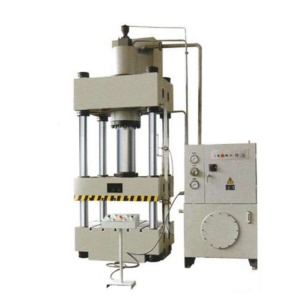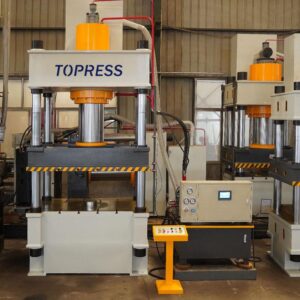Hydraulic press maintenance is crucial in ensuring smooth operation across a wide range of industrial processes, such as metal extrusion, sheet stretching, bending, and correction. Four-column hydraulic presses are known for their versatility and reliability, particularly in industries like automobile manufacturing. However, hydraulic system failures can frequently disrupt production, decrease efficiency, and increase costs. As a result, maintaining optimal performance through proper maintenance is essential for keeping operations running smoothly. In this article, we will explore three common hydraulic faults and offer troubleshooting methods to prevent costly downtime.

Common Causes of Hydraulic System Failures
The hydraulic system in a four-column hydraulic press commonly encounters issues like overheating oil temperature, air entering the system, and oil contamination. These factors are responsible for nearly 75% of hydraulic failures. Understanding and addressing these issues is key to effective maintenance and timely repairs.
First, hydraulic oil operates most efficiently within a temperature range of 35°C to 60°C. When the oil overheats, it loses viscosity, which compromises lubrication, leads to excessive wear, and causes leaks. Furthermore, overheating can result in the misalignment of components due to thermal expansion. In extreme cases, overheating may cause oil and water vaporization, leading to cavitation and system failure. Additionally, high temperatures accelerate the aging of rubber seals, causing leaks and reducing the system’s overall reliability. To prevent these problems, it is crucial to monitor oil temperature closely, maintain cooling systems, and replace seals regularly to ensure optimal performance.
Moreover, air entering the hydraulic system can cause unsteady actuator movements, increased vibration, noise, and accelerated wear of hydraulic components. Typically, this occurs due to leaks or low oil levels, allowing air to infiltrate the system. To avoid such issues, it is important to regularly check for leaks, maintain consistent oil levels, and bleed air from the system. By doing so, you can enhance system stability and minimize the likelihood of failure.
Furthermore, oil contamination remains a significant challenge. Dirt, metal particles, and water can gradually mix with the oil, damaging precision components, increasing internal leakage, and causing pressure loss and instability in operation. To mitigate this, it is vital to filter and replace hydraulic oil regularly. Additionally, maintaining a clean working environment and using high-quality oil stored under the right conditions will reduce contamination risks, thus extending the system’s lifespan.
Troubleshooting Specific Component Failures
Specific failures in hydraulic components can also impact the performance of the four-column hydraulic press. For instance, a malfunctioning electromagnetic safety valve can lead to pressure loss. This issue often arises from worn seals, a blocked damping hole, or a stuck solenoid valve core. To resolve this, begin by cleaning the valve components, replacing any damaged seals, and ensuring that the solenoid valve functions correctly.
In addition, a broken spring in the filling valve can cause poor sealing, leading to pressure loss. To fix this, replace the spring and grind the sealing surface to restore proper function and prevent leakage.
Another common issue involves worn seals in the main oil cylinder, which can lead to oil leakage between the upper and lower chambers. To address this, replace the seals and repair any damage to the cylinder’s inner wall to maintain proper pressure levels and prevent further issues.

Preventive Maintenance for Long-Term Reliability
Lastly, low oil levels in the oil tank can cause air to enter the suction port, affecting the hydraulic system’s performance. To resolve this, refill the tank with the correct grade of hydraulic oil and bleed the system to eliminate any air pockets.
In conclusion, regular maintenance and quick troubleshooting are essential to ensuring the long-term reliability of your hydraulic press. By addressing common issues such as overheating, air ingress, and oil contamination, you can significantly extend the lifespan of your four-column hydraulic press and keep it running efficiently.
If you are looking for reliable hydraulic presses or expert maintenance services, we are ready to assist you. Contact us today for customized solutions tailored to your industrial needs!




